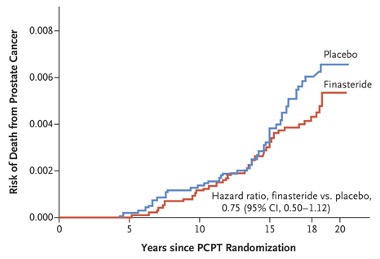Key Points:
- While some data suggest finasteride could lower the risk of death from prostate cancer, the data is not statistically significant.
- Finasteride lowers the risk of low-grade prostate cancer but may increase the risk of more lethal grades of prostate cancer.
According to the American Cancer Society, about 1 in 44 men will die of prostate cancer. Reports also show that prostate cancer is the fifth leading cause of death worldwide. It follows that preventing or delaying prostate cancer could lead to a longer life. To live a healthier, longer life New Zealand physician Brad Stansfield, M.D., says he has been taking 1 mg of finasteride, a prescription drug for treating baldness, for the past three to four years.
Finasteride blocks the conversion of testosterone to another hormone called DHT (dihydrotestosterone) by inhibiting an enzyme called 5-alpha reductase. DHT plays a significant role in male sexual development but does not play a beneficial role in adults. It does, however, contribute to prostate enlargement and male pattern baldness. With this in mind, can taking finasteride lead to a longer life by counteracting prostate cancer?
Can Finasteride Promote a Longer Life?
In 2003, the initial results from the Prostate Cancer Prevention Trial (PCPT) showed that 5 mg/day of finasteride reduces the prevalence of prostate cancer by 25%. However, the same study showed that finasteride increases the prevalence of aggressive forms of prostate cancer. This bewildered researchers, as reducing the risk of low-grade cancer while increasing the risk of high-grade cancer seems paradoxical. Consequently, a debate was kindled over whether finasteride should be taken to prevent prostate cancer.
Subsequent studies have since shown that finasteride makes it easier to assess the severity of prostate cancer by shrinking the prostate. This could bias assessments of cancer severity towards higher, more aggressive grades in men taking finasteride. For this reason, researchers reanalyzed the PCPT data to account for this bias and showed that finasteride does not increase the risk of aggressive prostate cancer.
Additionally, some researchers argued that if finasteride induces higher-grade cancer, which is more lethal, then it should also diminish survival rates. However, an 18-year follow-up of the PCPT participants showed that finasteride did not reduce survival rates. Furthermore, another PCPT follow-up showed that, while not significant, finasteride reduced the risk of death from prostate cancer by 25%.

Whether finasteride increases the risk of high-grade prostate cancer is still up for debate. One recent study showed an increase in high-grade cancer incidence while another showed no change in high-grade cancer incidence from 5-alpha reductase inhibitors (finasteride and dutasteride). However, both showed that 5-alpha reductase inhibitors reduce the risk of low-grade prostate cancer. Still, both studies showed no effect on survival, suggesting that finasteride and other 5-alpha reductase inhibitors do not prolong lifespan.
Is Taking Finasteride to Live Longer a Good Idea?
When it comes to living longer, there does not appear to be sufficient evidence to demonstrate that finasteride could increase the lifespan of men. However, Dr. Brad Stanfield seems more optimistic about this and may believe that finasteride will prolong his lifespan. Indeed, this could be possible considering that finasteride lowers the risk of low-grade prostate cancer. However, it is still possible that finasteride induces high-grade prostate cancer.
Additionally, potential side effects of finasteride include erectile dysfunction that can remain after ceasing the drug. Despite these risks and potential side effects, Dr. Stansfield says he is rolling the dice. Also, he is taking the dose used for baldness, which is 1 mg. He says that he is hoping to get away with just this low dose because he started the drug at a relatively young age (in his thirties). This is opposed to the men in the PCPT study who were 55 years of age and older and took 5 mg of finasteride.
Ultimately, one should consult their doctor if desiring to take finasteride for its off-label use as a preventive measure against prostate cancer.